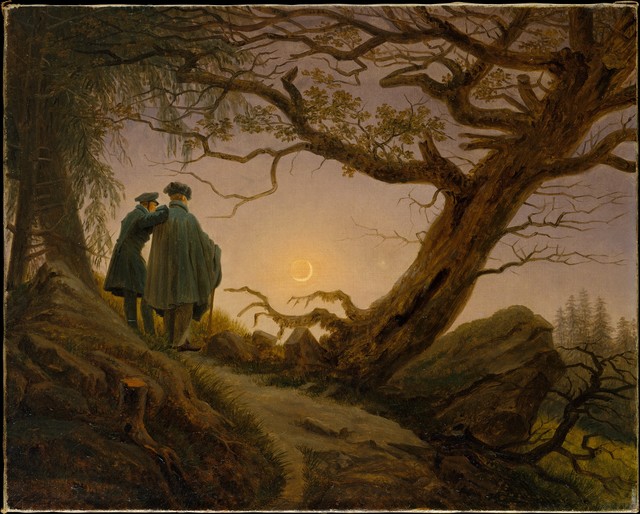Entry by Elian Ortiz: Two Men Contemplating The Moon

Full description
This is a beautiful painting of two men watching the moon (as described in the title). This oil painted masterpiece is a representation of Friedrich at right and August Heinrich at left. Romanticism is a time devoted to the appreciation of nature and its divinity, which is why we are appreciating the character of the painting from behind. Just as they are connecting with nature, so is the viewer. Romanticist art is characterized by the use of nature, especially landscapes. As the marvelous view on this painting, we can appreciate a sunset with an early moon; and its green, yellow and brown colors that are characteristics of the romantic movement art. We can assume that these men are engaged in a deep conversation; given the impression of the time and place of the painting, including the posture taken by them. The man at right has his shoulder on the other one, signaling trust and comfort between them. Worth to mention, this is a time where ideas of humans being spiritual individuals with feelings and souls, rather than a working machine was introduced. So, we can convey that they were engaged in a passionate conversation about life, and possibly a session of advising. Which is, very close to the play “Nathan The Wise” by Lessing, in one of the conversations with Saladin and Nathan. As when Nathan is giving advice to Saladin using an acnedote of a father who owned an unique ring that symbolized the leadership/ ownership of the house, then he made 3 rings and gave one to each of his sons, making each think that their ring is the real one. This ring being everyone’s god, and implying that they all might be real to those who believe it is and have faith. Then Saladin had a moment of interest, which led to trust and contentment with Nathan.
Author: Elian Ortiz
Comments
to view and add comments.
Annotations
No one has annotated a text with this resource yet.
- typeImage
- created on
- file formatjpeg
- file size4 MB
- creatorDavid Friedrich Caspar.
- credithttps://www.metmuseum.org/art/collection/search/438417
- rightsPublic Domain
- rights holderThe Metropolitan Museum of Art


